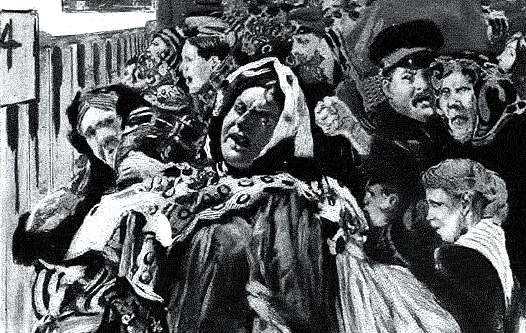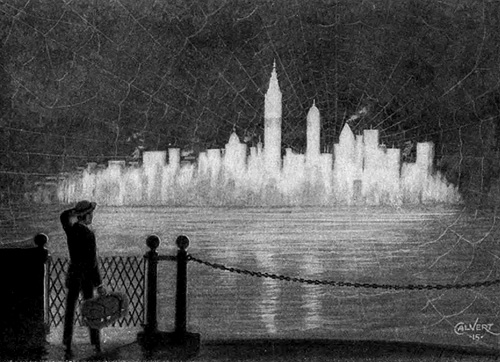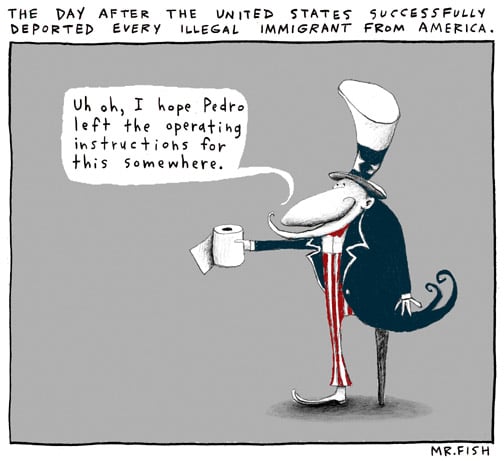Julia Preston, Surge in Immigration Laws Around U.S., The New York Times, August 6, 2007:
State legislatures, grappling with the failure of the federal government to overhaul the immigration laws, considered 1,404 immigration measures this year and enacted 170 of them, an unprecedented surge in state-level lawmaking on the issue, according to a report by the National Conference of State Legislatures.
Spurred by rising resentment in the country over illegal immigration and by the collapse of a broad immigration bill in the Senate in June, state legislators nationwide adopted measures to curb employment of unauthorized immigrants and to make it more difficult for them to obtain state identification documents like driver’s licenses.

Kirk Munro, “Some Americans From Oversea,” February 1898:
We of America do not seek to kill the immigrants whom we have invited to assist in the upbuilding of our great republic, but we nevertheless despise them, and rarely hesitate to express this feeling with a brutal frankness. While this ever-present animosity is general and applies to all foreigners, it has epochs of especial virulence against especial classes . . . . Recently our energies in the line of denunciation have been directed against a class of immigrants from Slavonic countries, who are settling certain regions of the Northwest that American farmers have deemed worthless for purposes of agriculture.
Much has been written and said against the “filthy Russians” the “ignorant Finns” the “groveling Polanders,” and even the thrifty Icelanders, who have established themselves in that portion of Uncle Sam’s domain. They are charged with crowding out the native-born American, stealing from him his birthright of free land, clinging to their own language and customs, refusing to become Americanized, lowering the standard of citizenship, reducing the price of labor, and in many other ways demoralizing the community at large.
Harper’s Index, June 2000:
Estimated ratio of immigrants arriving in the U.S. in the 1890s to the number returning home during that period : 3 : 2
Elizabeth Robins, “Embryo Americans,” September 1901:
I looked with unwelcoming eyes upon those future compatriots of mine, and I wondered which among that dirty, ill-smelling horde were to be the future millionaires, governors, masters, mothers of duchesses yet to be, and future vice-queens of India.

“The Future of America: A Biological Forecast,” April 1928:
The ideal of America as an asylum for the poor and oppressed of other lands once brought to us some of our finest stock, but in later years we were made the dumping ground for the paupers, insane, and criminals of several European nations. The result of our policy of importing cheap labor and of furnishing asylum to the discontented and defective is seen in the development of racial antagonism and caste, in the menace of low mentality, and in the alarming amount of crime, insanity, and pauperism in this country.
“Mi Casa No Es Su Casa”, November 1996:
From a Spanish-language pamphlet distributed this spring to Latino immigrants in Siler City, North Carolina. According to town officials, the pamphlet was intended to help Spanish-speakers “adjust to their new surroundings.
Pets such as dogs and cats are permitted in Siler City. Keeping chickens or goats within the city limits is illegal.
It is illegal to have garbage in your yard or to work on your car in the street or in your driveway.
In this country, it is completely illegal for a husband to hit his wife or his children for any reason. A man who does this will be sent to jail and may lose his children.
The thing that can help you most here is learning English. Anyone who wants to get a better job must learn English.
Paul Ford, Weekly Review, July 24, 2007
Former congressman Tom DeLay gave a speech about abortion to a gathering of college Republicans in Washington, D.C. “If we had those 40 million children that were killed over the last 30 years,” said DeLay, “we wouldn’t need the illegal immigrants to fill the jobs that they are doing today.

Louis Adamic, “Aliens and Alien Baiters,” November 1936:
Professional patriots, some disbalanced into fascistic fanatics, are exploiting the alien question to their strange ends. These individuals bedevil Congress as a whole with their flag-waving and their exaggerations and inaccuracies about the alien problem and obscure it and make it worse. They are generally doing their best to spread alien hatred and, through it, the mutual distrust of American citizens of diverse racial and national strains, thus retarding the process toward a desirable homogeneity of our population; and to induce the Government to violate America’s traditions of fairness, decency, humanity, and tolerance in dealing with all the people living within her borders, thereby increasing the complexity of her social, cultural, and spiritual condition in the near and distant future, lessening her ability to deal with it democratically, and threatening to inflict upon her certain characteristics of European fascist states.
Peter Marin, “Toward something American,” July 1988:
“Home” is for us, as it is for all immigrants, something to be regained, created, discovered, or mourned not where we are in time or space, but where we dream of being.


